This Tropical Island Has Some of the Most Unique Food in Africa
Picture fresh seafood, lots of coconut milk, and spices from across the world.
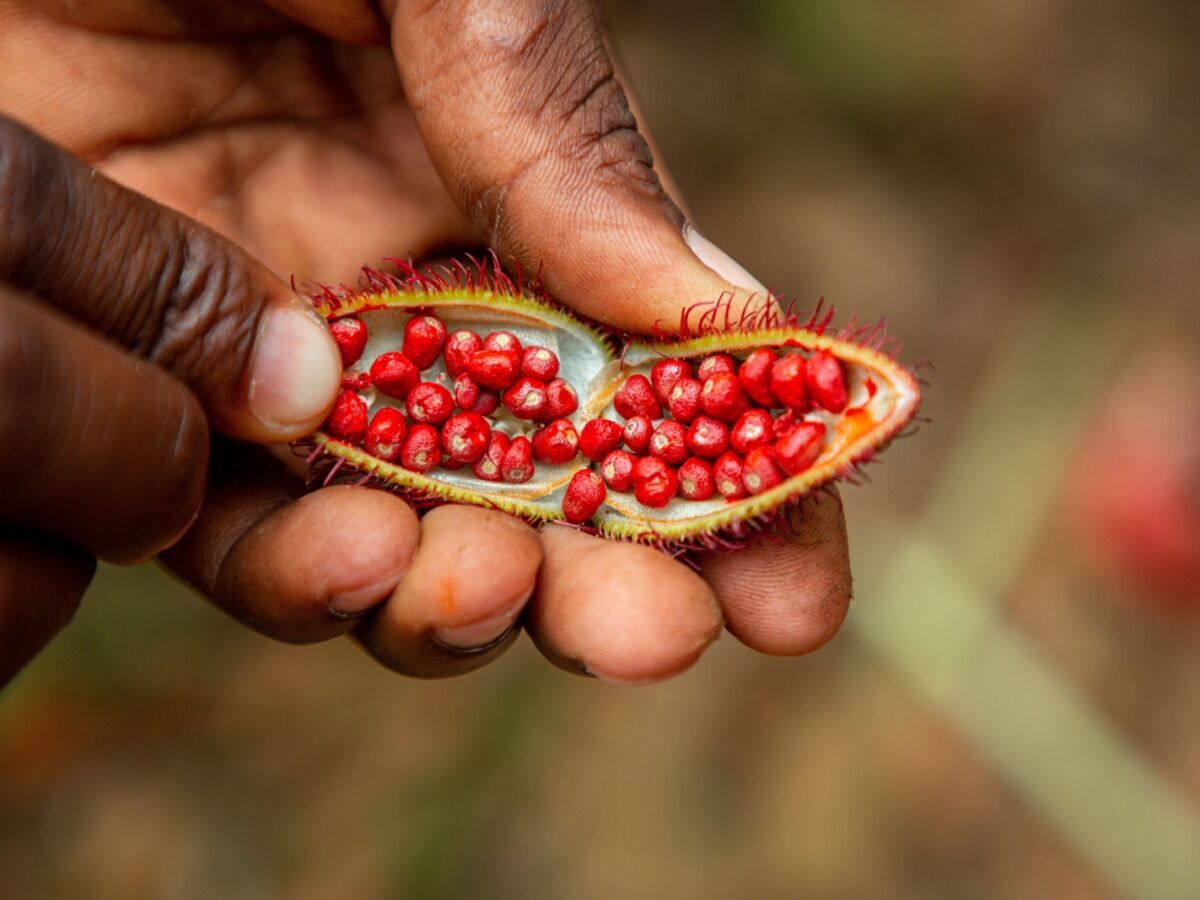
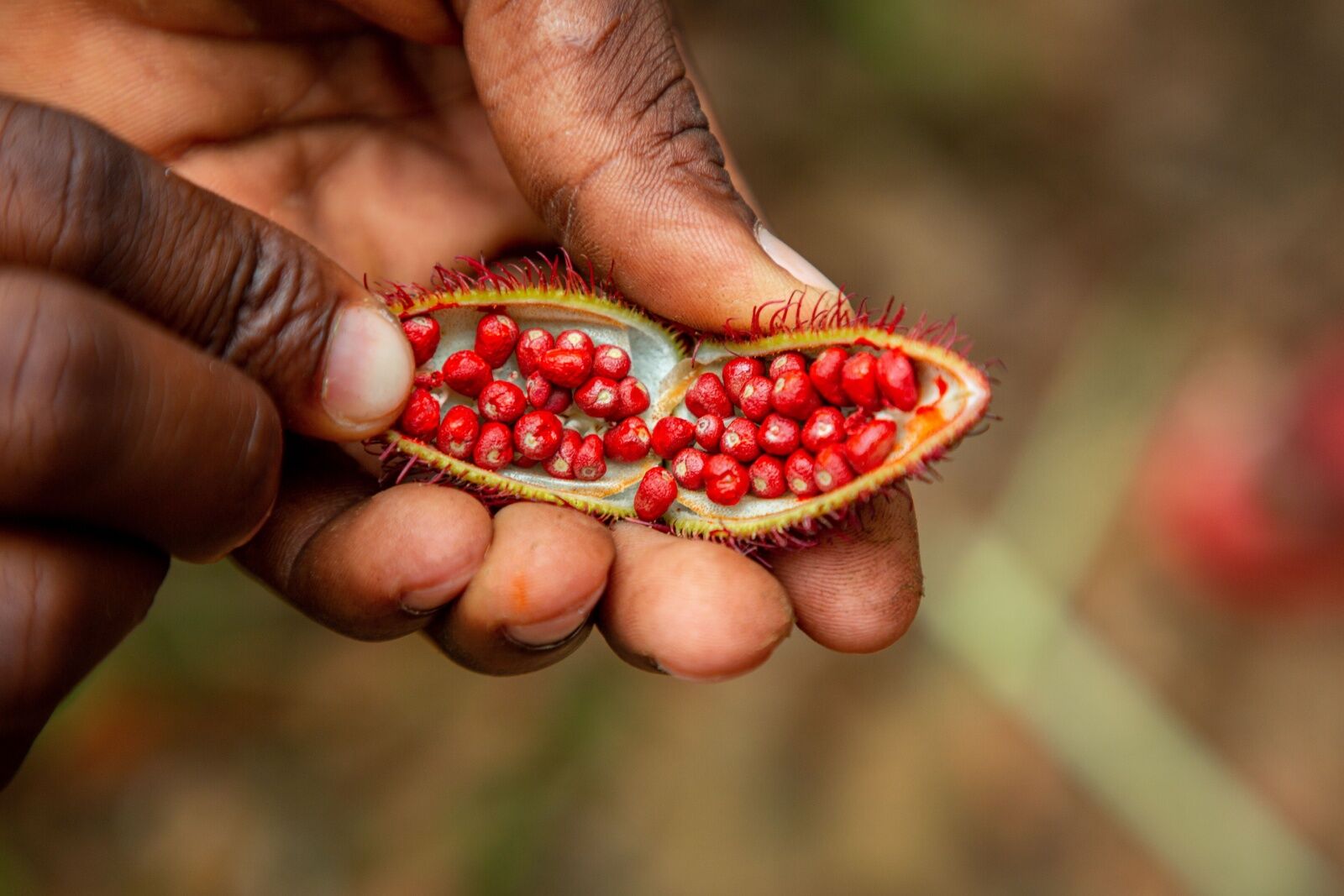
Most travelers landing in Zanzibar grab their bags and head straight for the white sand beaches and warm waters of Paje, Jambiani, or Nungwi. It makes sense — the tropical island in East Africa, located just off the coast of mainland Tanzania, is best known for its miles and miles of gorgeous coastline.
Resorts and hotels line those beaches with sunset views, infinity pools, and stylish restaurants every few steps. It’s easy to spend a week there without leaving the shoreline (or even your lounge chair).
But skipping Zanzibar’s cultural capital, Stone Town, means missing out on something special. As a UNESCO World Heritage site, Stone Town is a living museum of Swahili culture with Arab, Indian, and European influences reflected in its winding alleyways, vibrant markets, and historic architecture.
And as with most destinations, its historical influences have shaped its food. From fragrant spices to fresh seafood and fruits plucked straight from trees, the island’s dishes tell the story of its history. And in the last few years, a handful of culinary tours, cooking classes, and farm-to-table experiences have made it easier than ever to gain a deep understanding of Zanzibar’s food culture.
The colorful history of Zanzibar food
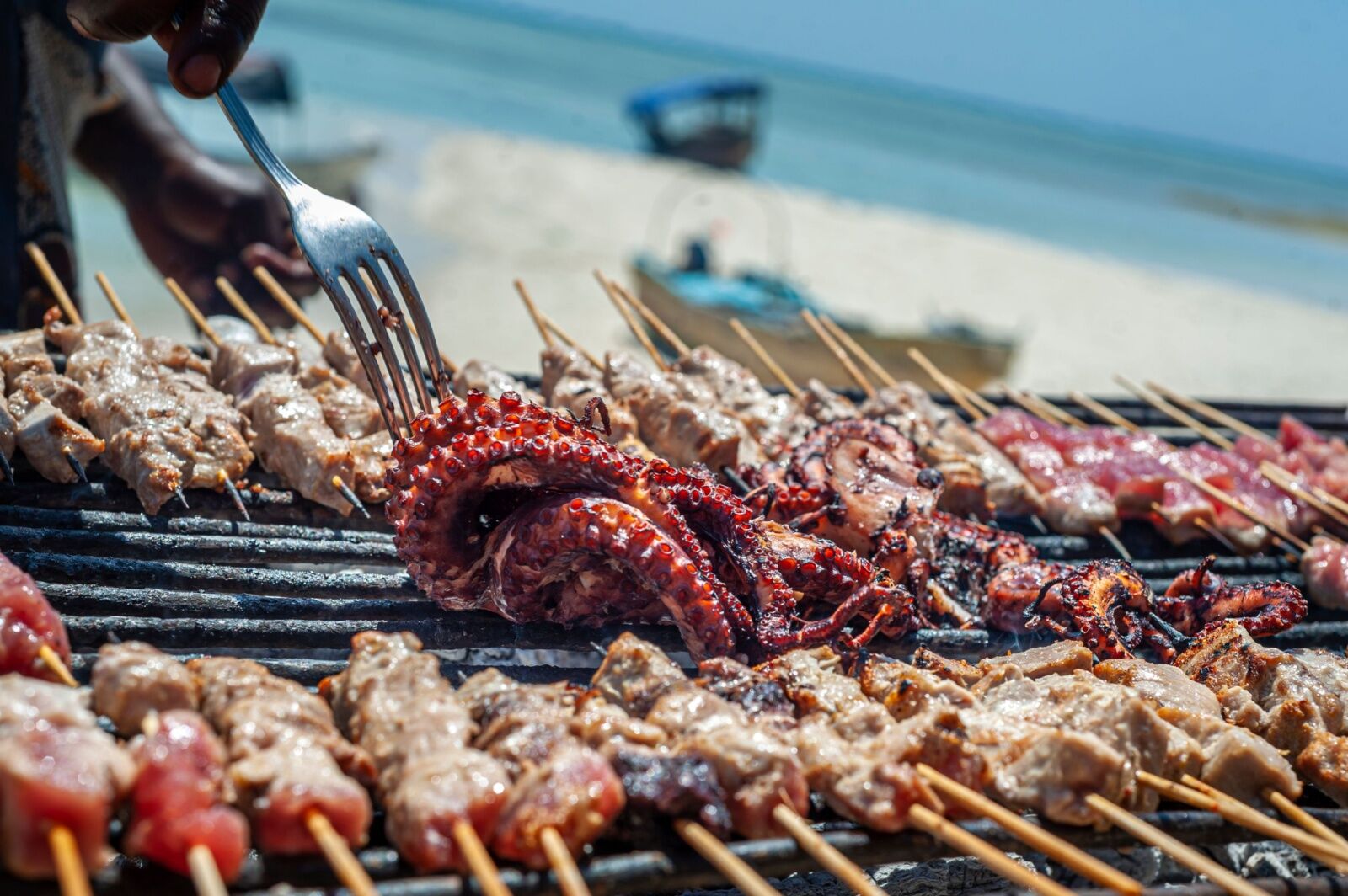
Fresh seafood is a staple of Zanzibari cuisine. Photo: Denys R/Shutterstock
Zanzibar’s food culture is a reflection of its history as a key trading hub in the Indian Ocean.
For centuries, the island’s strategic location attracted merchants, settlers, and travelers from Africa, the Middle East, India, and Europe. Each left their culinary mark.
“We have all these different cultures that have influenced us. Our history is so rich. This is what makes Zanzibari cuisine different from the rest of Swahili cuisine,” says Maskat Shineni, founder of Mamas of Zanzibar, a Swahili cooking class that teaches visitors how to prepare traditional Zanzibari dishes. Swahili cuisine spans East Africa’s coastal regions, including Kenya, Mozambique, and Tanzania, and is known for its slow-cooked coastal dishes with bright flavors and fragrant spices.
At its core, Zanzibari food is defined by what the island provides. Fresh seafood, tropical fruits, and staples like cassava, plantains, and sweet potatoes form the foundation of many of its dishes. Coconut is a key ingredient thanks to the island’s plentiful palm trees, and is used in cooking far more often than in Tanzania’s mainland cities, such as Dar Es Salaam.
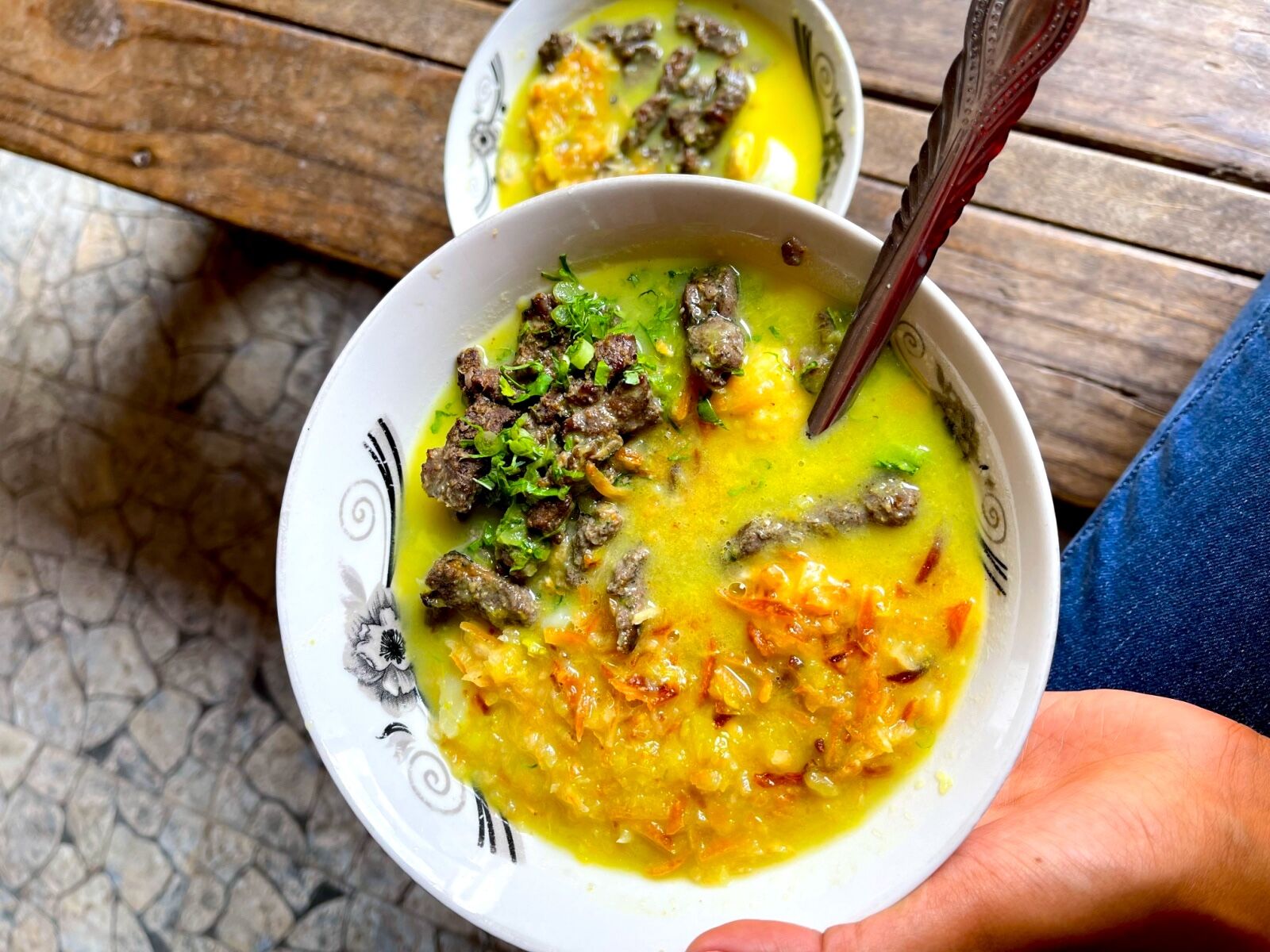
Urojo is a popular dish in Zanzibari cuisine. Photo: CapturedNouns/Shutterstock
Spices are another hallmark. Originally brought by Arab traders for commerce, spices have become deeply ingrained in Zanzibari food. But what sets it apart is how these spices are layered to create bolder, more complex flavors. “Our main spice is the clove—this is the karafuu,” Shineni notes. Cloves, grown abundantly in Zanzibar, impart a sweet warmth that defines many of the island’s dishes, like pilau rice. “We also use cardamom, black pepper, turmeric, and ginger,” she adds, explaining that the way Zanzibaris blend these spices is what makes them distinct. For example, cloves are paired with coconut milk in curries to create a rich, fragrant base.
Zanzibar’s cuisine highlights its history in other ways, too. Omani traders introduced pilau spices. Indian settlers brought curries, chapati, and samosas. Portuguese traders added citrus fruits to the mix, and British colonists helped shape tea culture.
Even with these layers of influence, Zanzibari cuisine keeps its own distinctive identity. One local favorite is kisamvu — cassava leaves that are pounded with garlic, onion, chili, and salt, before being boiled and finished with coconut milk. “When you’re pounding the leaves, the smell is so delicious,” says Shineni.
Seafood stews, like samaki wa kupaka (whole fish cooked in coconut milk with turmeric), are also staples, especially in coastal and rural areas. Breakfasts are typically hearty, boiled dishes like cassava and fish soup, and for celebrations, biryani takes center stage. It’s a tradition introduced through the island’s Indian populations. “Every Friday, you’ll find biryani and pilau on the menu in most homes. The spices give it a wonderful aroma,” explains Shineni.

The night market in Stone Town is popular with both locals and tourists. Photo: damn12/Shutterstock
Zanzibar is also home to tasty street foods, like urojo, also known as Zanzibar mix. This tangy, soup-like dish is made with a turmeric-infused mango broth and is typically served with a mix of fritters, boiled potatoes, hard-boiled eggs, and spiced meat or seafood. Coconut chutney, chili, and tamarind sauce are added as toppings.
Another popular street food is Zanzibar pizza, a savory and slightly sweet flatbread dish that’s pan-fried to golden perfection and stuffed with ingredients like minced meat, vegetables, egg, and cheese. You’ll find both dishes at a handful of busy booths at the Forodhani Gardens Night Market in Stone Town.
Learn like a local in a Mamas of Zanzibar cooking class
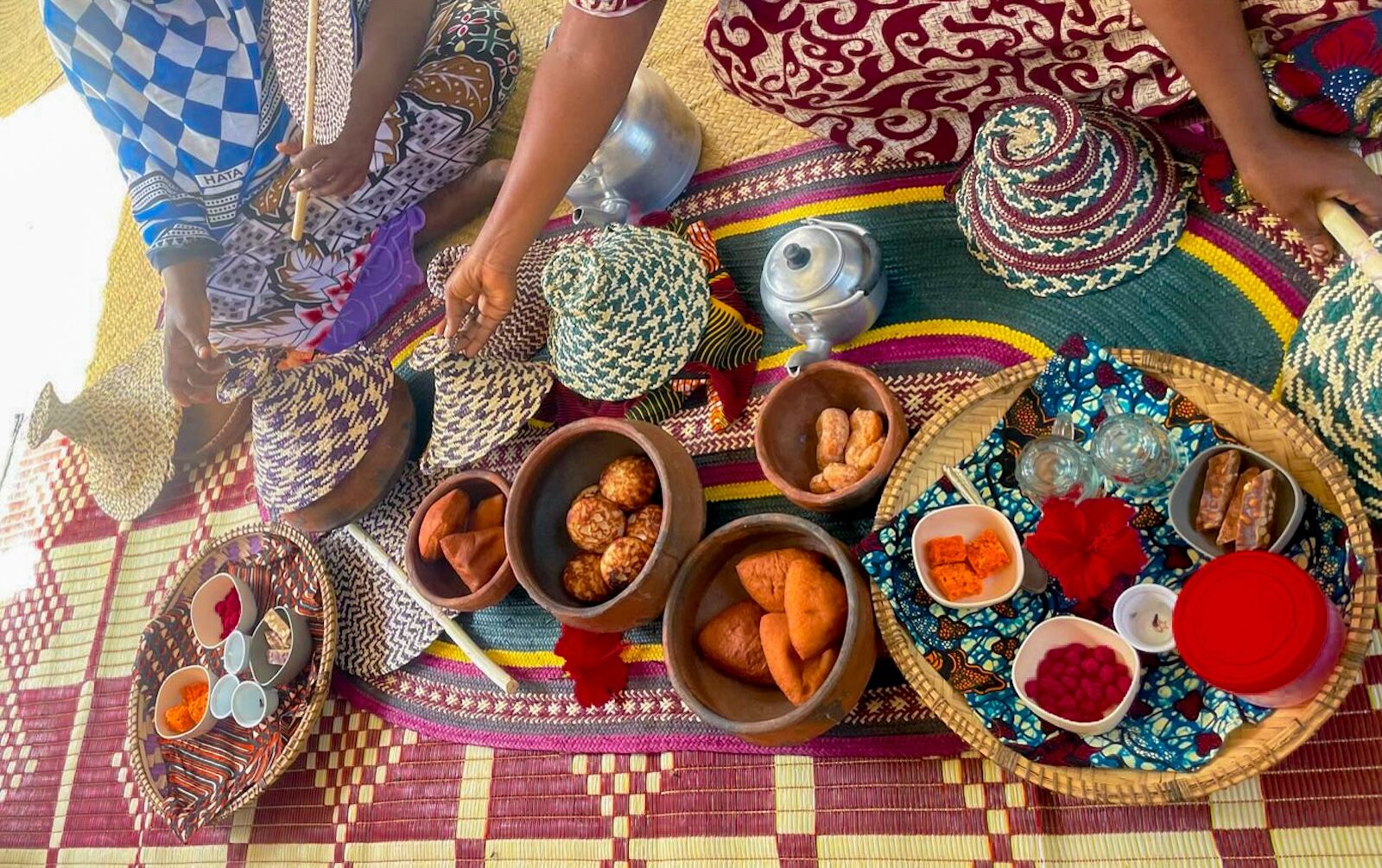
A fresh spread during a Mamas of Zanzibar cooking class. Photo: Riley Chervinski
One of the best ways to experience Zanzibar’s traditional food culture is through a cooking class, like the ones run by Mamas of Zanzibar. Located just outside Stone Town, this half-day experience introduces you to some of the island’s time-honored dishes while connecting you to the women who keep them alive.
Founder Shineni hosts the classes in her own home, giving guests a chance to cook the way locals do, rather than being in a hotel setting or commercial kitchen.
In her classes, guests start at the local market, where they shop alongside the Mamas, helping pick fresh ingredients for their dishes. Back at the open-air kitchen, you’ll roll up your sleeves and learn to make dishes like the aforementioned kisamvu and samaki wa kupaka, or ndizi tamu (plantains in coconut milk). Students use traditional tools like the mbuzi (coconut grater) and cook over clay charcoal stoves called seredani – two everyday staples of Zanzibar food preparation.
Shineni worked in hotels on the island for more than 15 years, during which time she realized that typical tours and activities were leaving guests feeling disconnected from the local culture.
She notes that guests would come to her wanting authentic experiences, which was difficult, as “most of the activities we had were touristy, so cliche, so advertised, and not really traditional,” she says. So, she started Mamas of Zanzibar to fill that gap in the tourist market and give guests a glimpse into local life.
Visitors to Zanzibar can also learn to cook straight from the source at Msonge Organic Family Farm, about 20 minutes outside Stone Town. The farm’s cooking classes give visitors hands-on experience with traditional Swahili dishes, using fresh ingredients harvested directly from the surrounding fields. The farm also offers farm tours to learn about Zanzibar’s native and introduced crops, see (and taste) what’s in season, and see how the small farm is using modern organic farming techniques.
Gathering around the table, Zanzibari-style
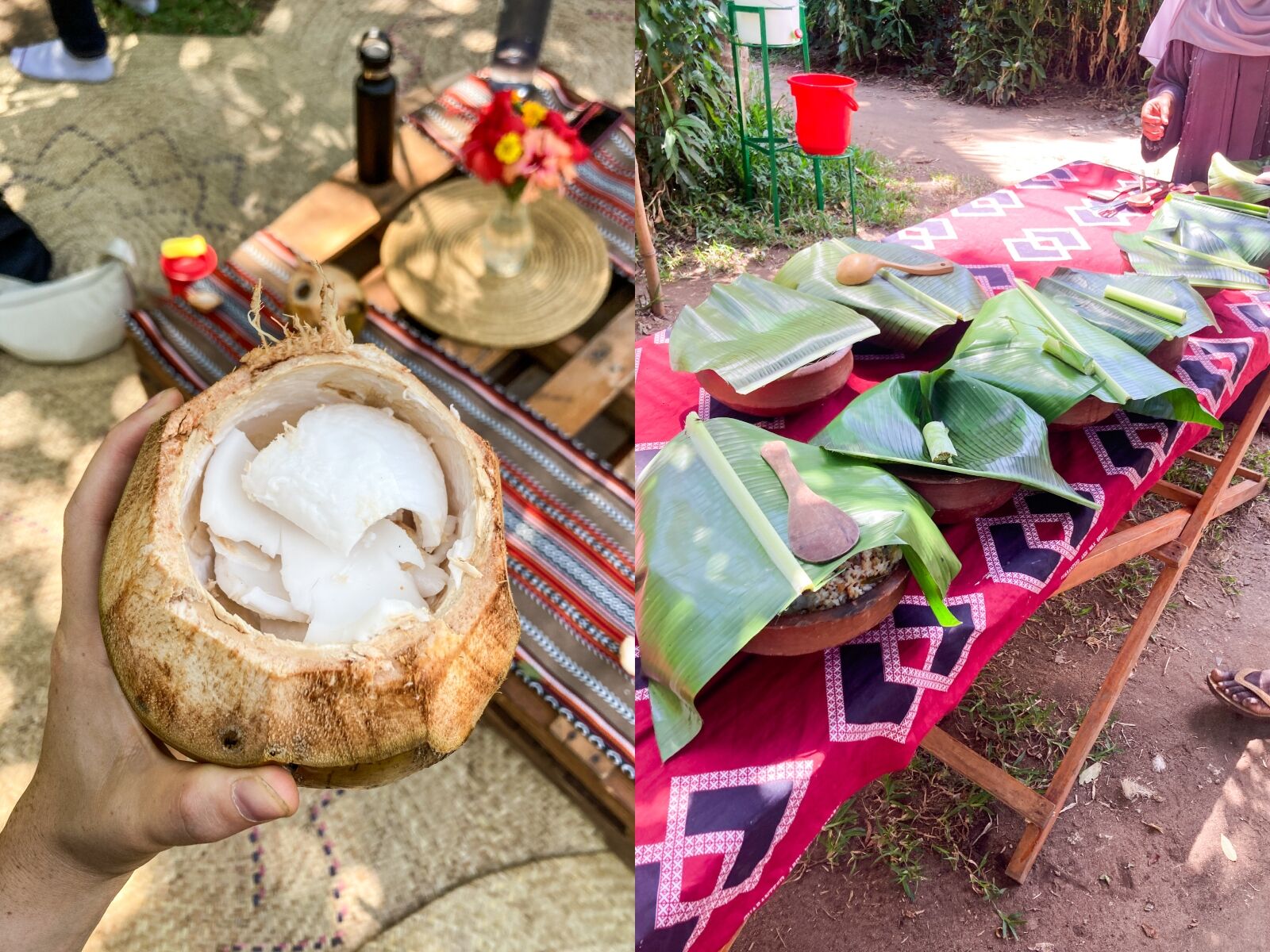
Lunch dishes at Msonge Farm. Photo: Riley Chervinski
In Zanzibari culture, dining is seen as a way to build community and celebrate life. Meals are traditionally shared, and sitting on the floor to eat, a common practice in Swahili households, creates an intimate atmosphere.
Even today, this communal style of dining remains especially strong in rural areas and during special occasions, where meals are served on majamvi (Swahili straw mats) and shared from large platters.
You can experience this traditional approach to dining firsthand at Msonge Organic Family Farm. Every Sunday, the farm hosts a farm-to-table lunch, where guests are seated on majamvi in lush gardens surrounded by fruit trees and vegetable fields. The buffet-style meal showcases traditional Swahili dishes made entirely from ingredients grown or raised on the farm, along with freshly pressed juices from seasonal fruits like mango and tamarind.
More information on Msonge Farm’s cooking classes and farm-to-table lunches is available on its Facebook and Instagram pages. Reservations can be made via WhatsApp (+255 778 778 760 or +255 754 536 630).
Take a day trip to Chumbe Island

Photo: Steffen Boerner/Shutterstock
Chumbe Island Coral Park, Zanzibar’s first marine conservation area, is best known for its thriving coral reefs and dense, biodiverse forests, as well as being a critically important sanctuary for endangered sea turtles and rare coconut crabs. It’s also a great place for a delicious, eco-conscious dining experience.
Visitors can book a day trip or stay overnight at the Chumbe Island Eco-Lodge, a small, award-winning eco-resort that operates sustainably and offers immersive experiences for its guests.
Included in a day trip to the island is a Swahili-inspired lunch featuring daily catches like grilled fish in coconut curry and octopus stew. Everything on the menu is prepared with seasonal, locally sourced ingredients, and the island’s staff actively follow sustainable fishing guidelines, avoiding ecologically sensitive fish species and promoting alternatives that support their conservation efforts.
Day trips cost $110 USD per person and include boat transport to and from the island, guided activities, and snorkelling equipment. Day trips are limited to ensure minimal environmental impact and can only be booked up to four days in advance. Note that the island is closed for annual maintenance for a month, usually beginning in mid-April.
Dine to the Sounds of Zanzibar’s taarab
Taarab music is the signature sound of Zanzibari culture and is heard especially often during special occasions and evening gatherings on the island.
Originating in the late 19th century, Taarab became a defining musical style in Zanzibar under the patronage of Sultan Barghash bin Said. Its soulful melodies are a fusion of Swahili, Arab, and Indian sounds, performed with instruments like the oud and qanun and accompanied by poetic Swahili lyrics that tell stories of love, longing, and life on the islands.
To experience an evening of tasty Zanzibari food and taarab music, travelers should visit the Emerson on Hurumzi Rooftop Tea House. There, guests sit on colorful Persian rugs, Swahili-style, and can sample a three-course menu of seasonal ingredients sourced from local markets and nearby organic farms. The evening is set to the soulful tunes of traditional taarab music by musicians from the Dhow Countries Music Academy, the only professional music school in Zanzibar.
Zanzibar is so much more than just its beaches, and its food scene invites you to connect with its culture, history, and people. Exploring it should be on every traveler’s list. ![]()
What's Your Reaction?





















































































